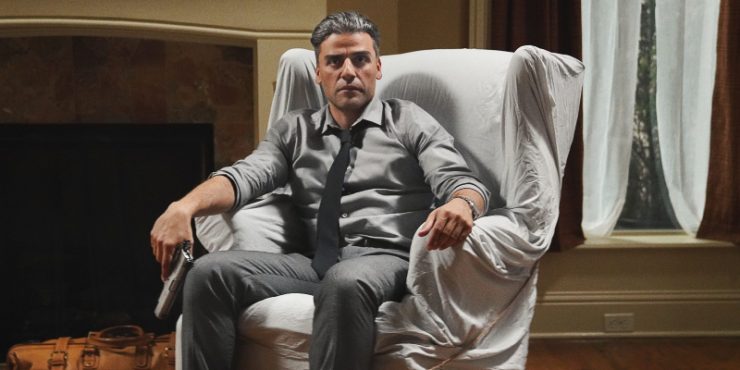Paul Schrader is a man preoccupied. His protagonists are men tortured by demons both inside and out. Their journey toward moral purity often comes at a great personal cost – usually their life. One of Schrader’s biggest preoccupations is the Bresson classic Pickpocket, which has stood as a narrative template for many of his twenty-one feature films. The Card Counter is no different. Oscar Isaac plays William Tell, a card-counting gambler with modest monetary goals that guard him from the stricter punishments for such behavior. Why develop a card-counting skill if you don’t want to win big money? William is just trying to pass the time. A former inmate at Levenworth and a Pfc at Abu Ghraib before that, William is in desperate need of a hobby, and cards is the one he likes the most.
William Tell is another one of Schrader’s Travis Bickles. Men who prefer anonymity in part because they know they have no place in structured society. Ethan Hawke’s Pastor Toller in 2017’s First Reformed was another one of these men. Toller was confronting serving a God he can no longer hear and the very real, suddenly realized fear of violently changing climate. Reformed was Schrader’s best movie in decades, and his first in a while that really translated the doom and existential dread inherent in everyday life. The Card Counter falls short of that standard, even if its script is much less hysterical and less dependent on transcendental theory. William Tell’s stakes – fighting violent impulses instilled in him as a torturer during the Iraq War – feel smaller.
William’s life is tiny and transient. He spends his days in casinos and his nights in motel rooms, covering the furniture completely in white linens, as if he’s ready to continue his career in torture at the drop of a hat. He sits at blackjack and poker tables, winning enough to get by, before moving along to the next town and doing it over again. His life tilts when he meets the young Cirk (Tye Sheridan), the son of a man who served in Abu Ghraib with William. Cirk’s father returned home a violent alcoholic who eventually killed himself, which has left Cirk with a lifetime’s worth of trauma and resentment. His body is ready to explode with vengeance and just needs a target. His target is John Gordo (Willem Dafoe), a private contractor who trained both Cirk’s father and William in the dark arts of torture. When Abu Ghraib was exposed, it was the soldiers who were punished (William served eight and a half years), while authority figures like Gordo walked away free. This is why Cirk thinks William would be the perfect partner for his plan.
William has moved past wanting revenge, too filled contempt with his own behavior to be compelled to hold others accountable. But he is gripped by nightmares of his past, of the pain he inflicted on others in the name of a cause he’s learned was illegitimate. William becomes focused on helping Cirk avoid this same empty life, taking the young man under his wing and bringing him along to card games. He gets in touch with La Linda (Tiffany Haddish), a fellow gambler who also runs a stable for investors interested in high-profile poker games. William decides to move away from small potatoes and move toward the big money. He wants to build a nest egg for Cirk, to convince him that hunting John Gordo is a false goal. When Cirk proves less receptive to the plan, William considers falling back on some older methods of persuasion.
Schrader has always been a director who works on a small scale and The Card Counter is no different. The sparseness of his style has a practical effect but it also tends to lean into the thematic nature of his stories. Like nearly all of his characters, William Tell is a man convinced of his own meaninglessness, comforted by his lack of stature in the world and with the people around him. It’s almost a burden when they’re awoken by purpose in these films, with the clear realization that they must sacrifice themselves to find any form of peace. Taxi Driver is the epitome of this, and that film had the benefit of being filtered through Martin Scorsese, one of the greatest directors of all time. Left to his own devices, Schrader as director has no qualms with devolving into hysterics, and he has even less qualms with borrowing directly from other classic films (aside from Pickpocket, First Reformed is an almost mirror image of Bergman’s Winter Light).
As messy as it might be, I can watch Schrader do his thing all day. The Card Counter is a mixed bag. Isaac – my favorite contemporary Hollywood dreamboat – is excellent here. Isaac always recalls early Pacino in the best way, and his silent intensity is perfectly calibrated for Schrader’s brooding tone. Isaac has been making the rounds in major studio projects like the recent Star Wars trilogy and Dune later this year; it’s good to see him fall back into more emotionally demanding work. I loved him in this, even if it isn’t as generous a showcase as many of Schrader’s other films. There is perhaps too much thematic retread between this and First Reformed for The Card Counter to be too effective. As a movie about gambling, it borrows technique from better films like Hard Eight and California Split, but misses the majesty (after the very first scene, we never see William actually count cards again). Cards is not what Schrader is really interested in after all, and we know that before we even sit in our seats.
Written and Directed by Paul Schrader










